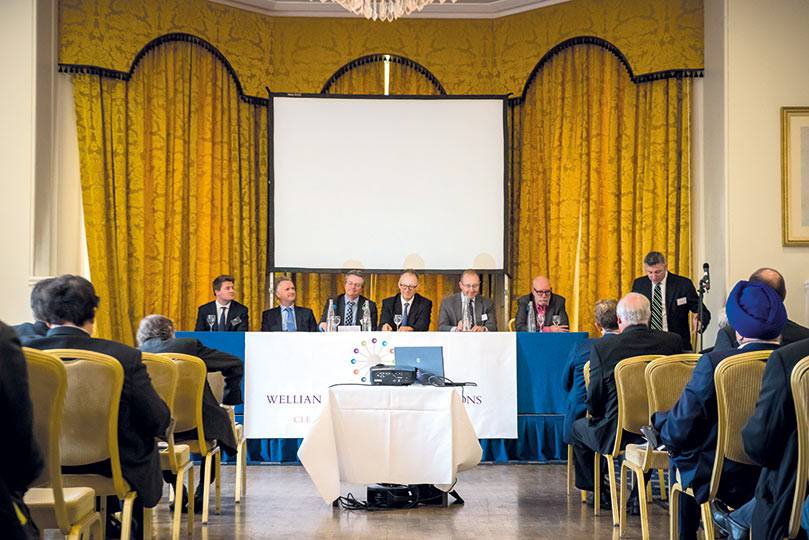Leading financial figures whose portfolios can be counted in billions of pounds congregated at the Royal Spa Hotel.
The occasion was the second annual investment symposium hosted by Wellian Investment Solutions, a well-established Tunbridge Wells investment firm. The main theme, in light of recent market turbulence, was risk management.
More than 50 advisors, fund managers and investors gathered last Wednesday to hear prominent speakers assess how best to manage risk, weather financial storms – and make millions in the process.
The first presentation was given by James Dowey, chief economist and chief investment officer of Neptune Investment, a firm which had over £5bn in assets under management at the start of the year.
Mr Dowey, also a PhD scholar at the London School of Economics, highlighted three main areas of risk his firm sees on the horizon: China, interest rates and technology.
He said: “China is a risk but it is the least worrying. We do not expect a Lehman moment as the Chinese government has already started to bail out the most heavily indebted companies since the tail end of last year.
“But the economy is slowing and their GDP statistics are too politicised to be reliable. We do not believe their growth is as high as the six per cent they make out. Although this does not mean there are no opportunities left for investors.”
On interest rates, Mr Dowey believes that when they rise, it will be a shock to the bond market.
“Be wary of bonds, it is no longer true that they are an easy way of making money,” he said.
But he believes technology poses the biggest threat to the way the markets will work, adding: “Technological advances will affect every sector and many companies will see their business models obliterated.”
He believes many people will be caught out by a technological minefield, which could result in pain for unwary investors.
He said: “It will not be good for the stock market. Many of the companies you know now will cease to exist.”
Following Mr Dowey was John Pattullo, a fixed-income fund manager at Henderson, which controls over £20bn in assets.
Mr Pattullo spoke of the risks which have come from quantitative easing and how it has inflated asset prices across the board, including in bonds, his specialisation.
He said this has contributed to volatility but added it can present ‘opportunities’ as well as risks.
But his main warning was on blindly following the herd, which had in the past led to his own fund taking losses.
He said: “My economics degree has been completely useless. In 2010 we got hit when most of the economists were predicting an increase in interest rates. We were over-confident and positioned ourselves to take advantage of this, but of course it did not happen and we took a hit.
“I no longer think interest rates will go up any time soon.”
Good investments are a matter of taking risk into account, he said, adding: “Risk is not just a number, it is common sense. In 2007 I wrote a piece in the Telegraph saying corporate bonds were a waste of time, yet people still gave us hundreds of millions to invest in them.
What the experts have to say…
Clive Beagles of JO Hambro Capital Management, which has about £16.2 billion under management as of February, spoke of the sections of the market he believes will offer the best returns.
Mr Beagles, who manages equities, said: “The stock market has become very polarised between overvalued and undervalued companies.”
He added that the long-running fashion to invest in mid-cap companies will be coming to an end, as many large-cap firms are now looking a good buy.
Recent market distress has created opportunities by making some equities cheap, he said.
And those sectors which are currently unpopular will offer the best returns, he said: “We are coming to the end of the banker-bashing so our fund has put more weight on financial equities and the same with commodities.”
He also warned ‘defensive’ stocks may be nothing of the sort, adding: “Many defensive sectors, such as tobacco, are overvalued and highly geared this can mean their risk actually increases.”
Richard Pease of the £1.2bn ‘start-up’ Crux Asset Management said the financial woe over the past eight years ‘has battle-hardened fund managers.’
Mr Pease, who was described by the Telegraph as a ‘star manager’, believes investors need to be prepared for the long game rather than hope for quick returns.
He said: “When you pick up the paper, you’re certain to read some frightening headlines about various economic crisis, such as with Europe or emerging markets.
“But you have got to look beyond the quarter or the year and brace yourself for some short-term pain for long-term gains.”
He gave an example of a firm he had invested in, Zodiac Aerospace, which had been performing well but eventually could not meet demand, leading to severe financial trouble. But ultimately the firm weathered the storm and is more valuable than ever.
Mr Pease said part of the reason he retained confidence was because he aimed to invest in companies where ‘management still had a stake in the company’.
He added: “I am a firm believer in eating your own cooking, so management which has its own money tied up in a company is more likely to make good decisions.”








